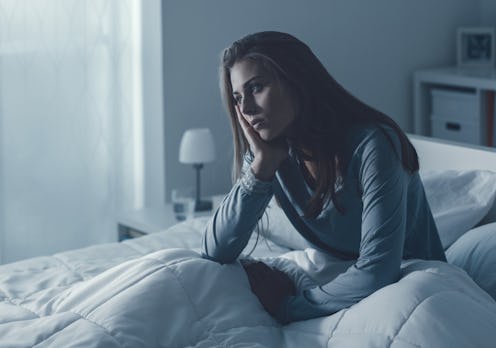Life
The Common Sleep Mistake To Avoid During Daylight Saving Time, According To An Expert

It's the most un-wonderful time of the year — Daylight Saving Time. That's right my friendlies, this Saturday night/Sunday morning, whether you're ready or not, you're traveling one hour into the future at 2 a.m. local time. And knowing which common sleep mistake to avoid during Daylight Saving Time can help you survive this whole time-travel thing relatively unscathed. While an extra hour of daylight is definitely welcome, losing an hour of sleep can affect you for weeks, and even increase your risk of getting into a car accident or experiencing a medical issue, Live Science reported.
If you live in Arizona or Hawaii, the only two U.S. states that don't practice Daylight Saving Time, you're going to wake up Sunday morning happier and more relaxed than the rest of us. For those living in the other 48 states, though spring forward means more light in the evenings, it also means darker mornings. If you, like me, have trouble getting your day started when it's still dark outside, you're probably dreading spring forward. Dr. Mia Finkelston, a board-certified family physician who treats patients via telehealth app LiveHealth Online, tells Bustle that brightening up your room can ease the difficulty of getting up when it's still dark.
If you're generally an early riser, but the time change has you tempted to sleep until first light, don't do it. It can actually really mess up your sleep cycle. "Waking up before the sun is up can be tough, so I recommend having some bright lights nearby that you can turn on as soon as you get out of bed. Open the blinds just as you would, and anticipate the sunrise. Put on some upbeat music if that gets you moving! The point is, do something that will energize you," she advises.
Because of the darker mornings and the desire to regain that lost hour of sleep, the most common mistake people make is sleeping in the Sunday following spring forward. "Resist the urge to sleep in on Sunday and avoid sleeping an hour longer in the morning," Pradeep C. Bollu, MD, a neurologist, director of Sleep Disorders Center and professor at University of Missouri, told NBC News.
Another thing experts, including Dr. Finkelston, consistently recommend is preparing for spring forward in advance by adjusting your bedtime so you go to bed 15-20 minutes earlier in the days leading up to Daylight Saving Time.
Because spring forward is tomorrow night, if you haven't already started, it's too late for this. However, you can still help make the transition easier by abstaining from alcohol, caffeine, bedtime snacks, and by powering down your devices at least an hour before bed on Saturday night.
In addition, Dr. Finkelston advises against taking naps in the days after the time change. Instead, try engaging in some type of physical activity to give yourself a little boost of energy. There's no doubt that Daylight Saving Time is tough, however keeping a consistent sleep schedule can help ease your exhaustion.
People tend to love or hate Daylight Saving Time with all their sleep-deprived hearts. No matter which camp you fall into, you can get through this difficult time like a boss by following the aforementioned guidelines. Good luck, and may the odds be ever in your favor.